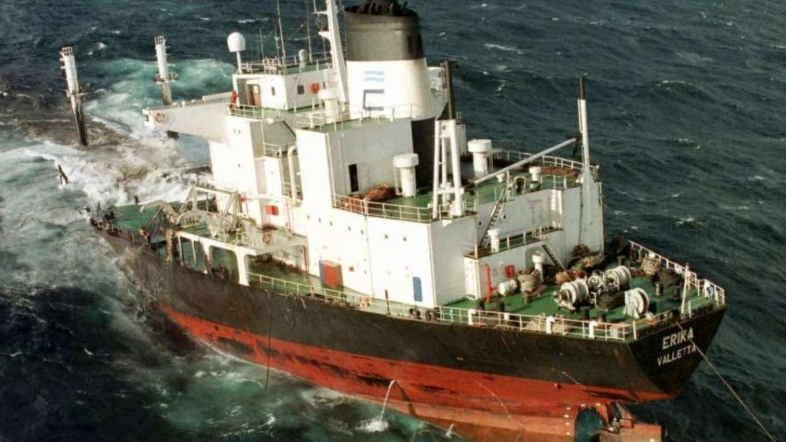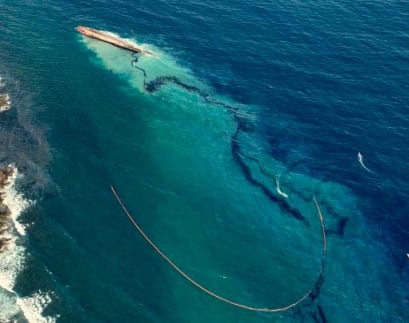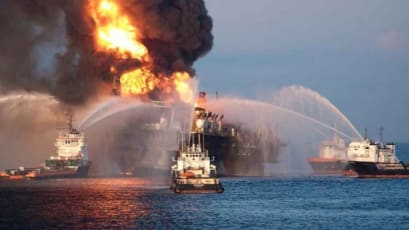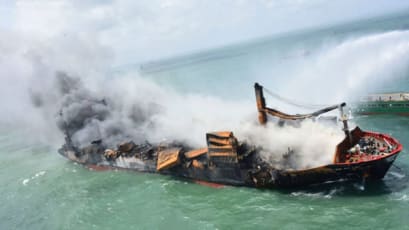Navigating the storm: OSRL’s response to the MV Erika spill
In December 1999, OSRL responded to the MV Erika, a tanker caught in severe weather conditions in the Bay of Biscay. The vessel sank after being structurally damaged, resulting in an oil spill.
Background
In December 1999, the tanker MV Erika, carrying 31,000 tonnes of heavy fuel oil, broke in two and sank during a severe storm in the Bay of Biscay, France. This incident resulted in a significant oil spill, necessitating a comprehensive response to mitigate environmental damage.

Response activation and context of OSRL’s involvement
The client engaged OSRL to supply both equipment and skilled personnel for the response efforts. Upon the client's request, OSRL mobilised a team of five responders, including French speakers, to provide offshore equipment and support.
Two team members were dispatched to the client's headquarters in Paris, while three were sent to the incident site in Saint Nazaire.
Due to ongoing severe weather conditions, offshore response activities were temporarily halted for safety reasons. OSRL maintained close coordination with the wider response effort and returned to the field in February to provide targeted shoreline clean-up support once conditions allowed
Main goals and priorities
- Assess and implement offshore response strategies in collaboration with French Navy personnel.
- Conduct shoreline surveys to evaluate contamination levels.
- Develop and execute an action plan for effective shoreline clean-up.
- Provide technical guidance and site management to local authorities and response teams.
Unique challenges
- Language barriers, leading to OSRL including proficient French-speakers in the team to facilitate communication.
- Severe and persistent storm conditions hindering initial response efforts and preventing immediate oil containment.
- Coordination with multiple agencies, including the Securite Civile, Army, Navy, and Fire Brigade, under the French national plan (Polmar Terre).
- Managing operations across multiple remote sites with a large number of personnel.
- Cleanup operations on tourist beaches during Summer months (island population increases from 4 000 to 40 000 in the Summer)
Response methodology
- Conducting shoreline surveys to assess contamination level and priority areas. This informed the development of an action plan focusing on providing technical advice to local teams, continuous site assessments, progress reporting, and implementation of site management principles.
- Working with various French agencies to implement the shoreline clean-up plan, which included the use and maintenance of high-pressure washers (Karcher and Kew) for decontamination efforts. Close collaboration with all parties involved ensured every team adhered to the same high standards of response techniques.
- Collaboration with Senior French Navy personnel to advise on and support implementation of offshore response strategies.
Based on Belle Ille en Mer, a small island off the Brittany coast and the French Department of Loire Atlantique, we were generally working 3 week rotations from March to December 2000. We worked closely with the Securite Civile, Army, Navy and Fire Brigade who were mobilised according to (one of) the French national plans (Polmar Terre) under the direction of the relevant local authorities. Working multiple, remote sites involving hundreds of people meant long days and hard work.” – Marcus Russell, OSRL
Results
The collaborative efforts led to the successful assessment and initiation of clean-up operations on contaminated shorelines. The implementation of structured site management and technical guidance facilitated effective coordination among the numerous agencies involved, contributing to the overall success of the response.
Key learnings
- The importance of language skills and cultural understanding in international response operations.
- The necessity of flexibility and adaptability in response plans to accommodate unforeseen challenges such as severe weather.
- The value of establishing strong working relationships with local agencies and authorities to ensure cohesive response efforts.
Why choose OSRL
With decades of experience and a global team of experts, we provide proven solutions tailored to diverse challenges. Our extensive inventory of specialised equipment enables swift and effective responses to spills of all magnitudes. We collaborate with local organisations and regulatory bodies worldwide, ensuring seamless integration and alignment in response operations. By leveraging the latest advancements in spill response, we continuously enhance our methods and capabilities to address evolving environmental and industry needs.
Want to talk about spill response?
OSRL offers a holistic approach to response, with solutions for offshore, inland and subsea incidents. Our teams are trained to operate in all environments—from remote regions to extreme cold—and bring specialised capability to all aspects of spill response, including areas like oiled wildlife that require specific expertise. Our members get access to technical advisors, our Global Dispersant Stockpile, aviation services, and equipment hire solutions.
Find out more about our Membership options.





